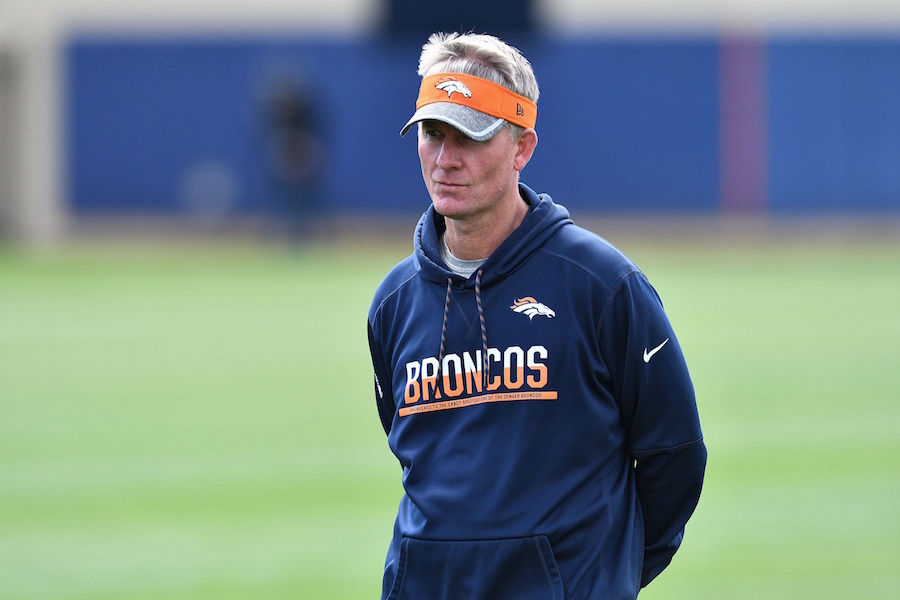“We’re always going to adjust to our personnel.”
And with those words, Mike McCoy should have your vote of confidence.
Perhaps it’s not quite that simple. As many a football observer has debated whether it’s the Jimmys and Joes or the Xs and Os. In truth, the best football teams have a healthy mix of true talent, good coaching and smart play calling. It’s not A or B, it’s C – all of the above.
Whether or not the Denver Broncos have the “Joes” is up for debate. Specifically, whether or not the Broncos have the “Joe” at quarterback is probably the most important question heading into the 2017 season. But one thing is for certain, Mike McCoy, the Broncos new-old offensive coordinator, will play to the strengths of his personnel – including and most importantly, his quarterback.
On Thursday at Dove Valley, as the Denver media continued its quest to glean that single clue that could ultimately reveal who the Broncos next starting quarterback will be, McCoy told them the one thing that actually matters right now: He’ll play to the strengths of his quarterback, no matter who it is.
Like any coordinator in the NFL, McCoy has “his” system. He likes what he likes. He has tendencies. He prefers a certain style of play.
So did Gary Kubiak. And while everyone could see that Peyton Manning was aging (or injured) in 2015, it was also obvious that the Sheriff was no longer driving the ol’ Buick. No, he’d been handed the keys to a new vehicle that seemed foreign at best, and clunky at worst. Under Kubiak, regardless of who was playing under center – Manning, Brock Osweiler, Trevor Siemian or Paxton Lynch – the same system was favored and implemented.
Clearly, Kubiak’s method had some merit – hey, he won a Super Bowl – but the offense, and perhaps even some of the aforementioned quarterbacks, suffered. In terms of points scored, the Broncos went from second in 2014, to 19th and 22nd in 2015 and 2016 respectively. In total yards, Denver’s offense ranked fourth in 2014, which was followed by rankings of 16th and 27th. The Broncos great defense could carry the load for 2015’s “middle of the road” offense; it could not shoulder the burden of last year’s debacle.
Unlike Kubiak’s short stint as Denver’s head coach, McCoy has a history of being flexible. His system is not bigger than the overall objective – racking up yards and scoring touchdowns.
After four quarterbacks, three offensive coordinators, two head coaches, two Super Bowls and one ring, it feels like forever ago that McCoy was calling the shots in Denver. It’s all but forgotten that he was handed a quarterback combination of Kyle Orton and Tim Tebow heading into the 2011 season, a campaign in which the Broncos miraculously (perhaps literally) found their way into the playoffs.
Orton and Tebow could not have been more different. From the arm with which they threw the ball, to the way they led a team – and every single thing in between – Orton might as well have been playing ice hockey, while Tebow could have been playing baseball (wait…). And when the decision was made – following a 1-4 start and heading into the bye-week – that Tebow, and not Orton, would get the start in Week 7, McCoy somehow made it work.
It wasn’t pretty – certainly not “Peyton Manning” pretty (like it was under McCoy’s supervision in 2012), but it worked. On the fly, McCoy reinvented who the Broncos were and what they did on offense. With Tebow’s completely unorthodox style of quarterbacking, McCoy quickly learned what might work and what might not. And he rolled with it. The rest, as they say, is history. John Elway concluded that in the long term, Tebow’s ways likely wouldn’t’ work. When forced to make it fly, McCoy excelled.
By the same token, immediately following the Tebow-led Broncos, McCoy didn’t make a 36-year-old, patched-together Manning run the pistol, read-option offense. McCoy made Tebow’s offense passable (no pun intended) and quickly converted a Manning-led offense into the second-highest scoring unit in the NFL – all within the span of 12 months. One offense was downright ugly. One was pretty and precise; both were relatively effective considering the personnel. McCoy was the brains behind both.
So here’s the bad news: The Broncos offense, or more specifically, their quarterback position, might not be pretty in 2017. Not healthy Peyton Manning pretty. Whether it’s “Trusty (we think) Trev” or “Paxton Potential,” McCoy won’t be dealing with one of the NFL’s all-time great passers. In fact, he could very well be dealing with two quarterbacks – like he was with Orton and Tebow – who are completely dissimilar. Trevor Siemian’s limitations might be more physical (we saw that last season) while Paxton Lynch’s struggles might come from a lack of experience (its’ just a fact). Siemian and Lynch aren’t necessarily “Orton and Tebow,” but that’s a closer comparison to, oh, let’s say “Manning and Philip Rivers.”
But here’s the good news: Mike McCoy might not really care (that much) who starts at quarterback against his former Chargers on Sept. 11. And even if he does, it won’t matter – he’ll do what’s best for that particular quarterback.
“We’re trying to figure out what those guys do best,” McCoy said Thursday when asked whether or not the playbook will be centered around the strengths of his quarterback.
Translation: Of course.
That’s what Mike McCoy does. And for a team that doesn’t quite know what the future of the quarterback position holds, that’s exactly the approach – and the kind of coordinator – required.
